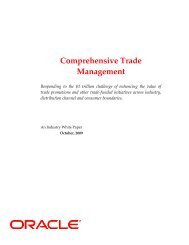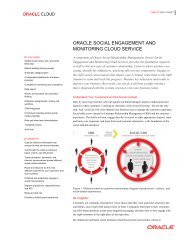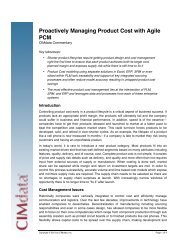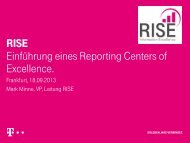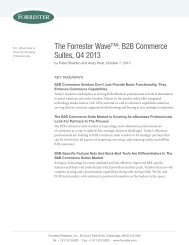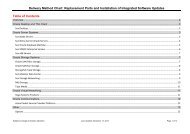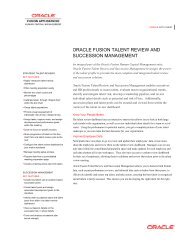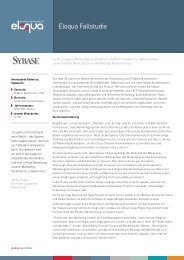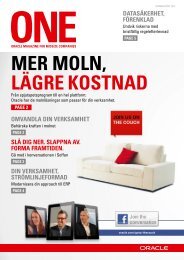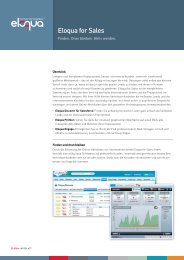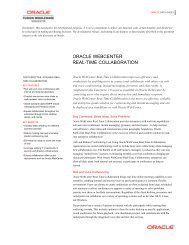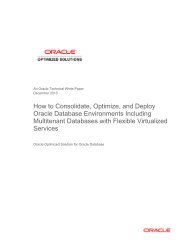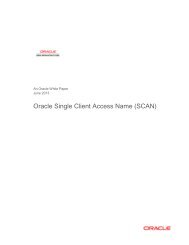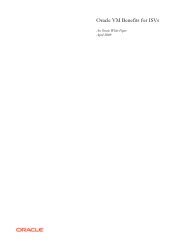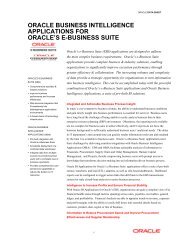Oracle Thesaurus Management System (PDF)
Oracle Thesaurus Management System (PDF)
Oracle Thesaurus Management System (PDF)
You also want an ePaper? Increase the reach of your titles
YUMPU automatically turns print PDFs into web optimized ePapers that Google loves.
ORACLE THESAURUS<br />
MANAGEMENT SYSTEM<br />
• Global centralized terminology<br />
management<br />
• TMS classification engine<br />
supports mapping verbatim<br />
terminologies to standard<br />
terminologies<br />
• Supports outsourcing<br />
verbatim term classification<br />
tasks<br />
• Supports custom or vendor-<br />
supplied dictionaries<br />
• Supports dictionary versioning<br />
and access to previous<br />
versions<br />
• HTML browser provides<br />
enterprise-wide repository<br />
searching<br />
• API-driven interface enables<br />
custom application integration<br />
• Role-based security allows<br />
both data- and functionrelated<br />
access<br />
• Workflow implementation<br />
facilitates control and<br />
reporting of user activities<br />
<strong>Oracle</strong> <strong>Thesaurus</strong> <strong>Management</strong> <strong>System</strong> (TMS) addresses the<br />
1<br />
ORACLE DATA SHEET<br />
complexities associated with managing global thesauri. Designed to<br />
manage and classify free text captured during the drug development<br />
process, TMS meets the needs of multinational pharmaceutical,<br />
biotechnical, and medical device companies, contract research<br />
organizations, academic institutions, and regulatory authorities by<br />
providing a worldwide, scalable terminology repository. Within the<br />
<strong>Oracle</strong> life sciences application suite, TMS provides terminology<br />
services for <strong>Oracle</strong> Clinical, <strong>Oracle</strong> Remote Data Capture, <strong>Oracle</strong><br />
Adverse Event Reporting <strong>System</strong>, and <strong>Oracle</strong> Life Sciences Data<br />
Hub.<br />
<strong>Oracle</strong> TMS in the Drug Development Process<br />
It is a well-established benchmark in the pharmaceutical industry that every day<br />
gained in accelerating product registration could be worth $2-3 million in additional<br />
sales revenue. One of the most time-consuming tasks within the drug development<br />
process is classifying verbatim terms to permit deriving standard medical and drug<br />
terms for use in analysis from the free text originally captured.<br />
<strong>Oracle</strong> TMS streamlines this critical and costly task by providing a centralized,<br />
globally available repository of dictionary terms and associated verbatim terms.<br />
Information in the repository is accessible through advanced searching and<br />
classification algorithms. TMS supports all dictionaries required by international<br />
regulatory authorities. Additionally, TMS can support and integrate with<br />
company/organization-specific dictionaries and legacy applications. The result is a<br />
global facility to standardize terminology use across dictionaries, computer<br />
applications, time, and organizations.<br />
Comprehensive <strong>Thesaurus</strong> Implementation and <strong>Management</strong><br />
TMS has virtually no limitations on the number, organization, or use of dictionaries.<br />
Since many dictionaries exist for different types of information, their organization<br />
and defined hierarchies vary considerably. Specifically, <strong>Oracle</strong> TMS:<br />
• Allows access to any number of dictionaries, including multiple versions of the<br />
same dictionary<br />
• Supports any number of hierarchy levels<br />
• Supports custom or commonly used dictionaries, such as MedDRA, MedDRA-<br />
J, MedDRA SMQs, SNOMED, ICD9, WHO-ART, and WHO-Drug
• Provides user-definable attributes for each term in a dictionary<br />
• Provides Web-deployed browsing of an entire dictionary hierarchy<br />
2<br />
ORACLE DATA SHEET<br />
• Permits searching for terms within a level, with the result showing related<br />
elements above and below<br />
Operations in a Globally Distributed Environment<br />
Drug development in today’s pharmaceutical enterprise is a global operation, and it<br />
is information technology that enables organizations to execute complex business<br />
processes throughout the global enterprise. As part of this technology, <strong>Oracle</strong> TMS<br />
meets the stringent requirements of global dictionary management with:<br />
• A single, global repository for flexible mapping of verbatim term assignments<br />
to any combination of dictionary terms, whether supplied by a vendor or<br />
generated internally<br />
• Scalability and reliability of <strong>Oracle</strong>’s industry-leading technology<br />
• The <strong>Oracle</strong> Symmetric Replication option, available for high performance in<br />
globally distributed environments when using replication, definition, loading,<br />
and maintenance from one master site, and classification from any site<br />
• Full Web deployment to take advantage of the lower costs associated with<br />
centralized configuration management<br />
• Usage of bitmap indexes to improve performance<br />
Dictionary Versions and Version Control<br />
Most vendor-supplied dictionaries are released with periodic updates. TMS permits<br />
these releases to be managed and controlled, permitting access to and use of earlier<br />
dictionary versions through virtual dictionaries.<br />
Versioning Verbatim Term <strong>Management</strong><br />
TMS provides an environment to assess the impact of dictionary versioning on<br />
verbatim terms linked to the dictionary. Reassignment of verbatim terms during<br />
dictionary versioning ensures continuity in the ongoing maintenance of an<br />
organization’s verbatim term pool.<br />
Point in Time (Virtual) Dictionaries<br />
TMS permits users to create (instantiate) a dictionary such as MedDRA or WHO-<br />
Drug. This dictionary is considered the “base” dictionary, where the most recent<br />
dictionary data resides. A virtual dictionary is a base dictionary at a particular point<br />
in time. The virtual dictionary inherits the dictionary structure rules of the base<br />
dictionary and any data active at the specified point in time. Such virtual dictionaries<br />
can be used for classification purposes.<br />
Virtual dictionaries also provide functionality for:<br />
• Periodic safety reporting across dictionary versions<br />
• U.S. Food and Drug Administration (FDA) audit reporting at the close of<br />
specific studies
• Reporting on classifications at given points in time<br />
Dictionary-to-Dictionary Mapping<br />
3<br />
ORACLE DATA SHEET<br />
TMS allows dictionary-to-dictionary relations (mappings), providing key support for<br />
the following functionalities:<br />
• Translation Dictionaries: TMS supports multi-language coding by establishing<br />
different language dictionaries, with cross-dictionary links to provide<br />
terminology equivalence<br />
• Dictionary Migration Efforts: Cross-dictionary links can support relationships<br />
between legacy dictionaries or company/organization dictionaries and vendor<br />
dictionaries<br />
HTML-Based Dictionary Browser<br />
Designed for the analytic/read-only user, the TMS ‘lite’ dictionary browser is an<br />
easy-to-use, HTML-based dictionary browser that allows users to browse and search<br />
any of the dictionaries loaded in TMS. The interface is generated from the TMS<br />
repository and gives users the ability to navigate a dictionary hierarchy and perform<br />
comprehensive searches with <strong>Oracle</strong> interMedia Text capabilities, such as soundex<br />
searches, stem searches, and thematic searches.<br />
The HTML browser enables searches based on MedDRA SMQs, for both<br />
terminology and patient data.<br />
Advanced Searching and Autoclassification<br />
<strong>Oracle</strong> TMS allows the development and integration of advanced algorithms to aid<br />
in coding and/or searching the thesaurus repository. Defined as TMS ‘search<br />
objects,’ these algorithms interface directly with TMS and can be used for<br />
autoclassification, candidate term identification, and extended searching across<br />
multiple dictionary levels.<br />
TMS search objects can also be used to integrate user autoclassification and<br />
searching processes, as well as new, vendor-supplied autoclassification and<br />
searching processes. TMS search objects can utilize the interMedia option,<br />
containing ConText, which enables searches based on fuzzy logic, language<br />
stemming, and lexical search methods. <strong>Oracle</strong> Consulting offers an add-in product<br />
that assists organizations in defining and creating TMS search objects.<br />
API-Driven Architecture and Integration<br />
To assist in classifying terms, many organizations have developed in-house<br />
applications implemented with standard and custom dictionaries. Upgrading to new<br />
environments, or loading new dictionaries such as MedDRA, can be difficult and<br />
time-consuming. <strong>Oracle</strong> TMS has been designed with a set of application<br />
programming interfaces (APIs) to facilitate integration with legacy systems. With<br />
this API-driven system, an enterprise can:<br />
• Load terms into a dictionary<br />
• Test terms to ensure conformity with dictionary definitions
4<br />
ORACLE DATA SHEET<br />
• Submit and classify verbatim terms using all of the TMS autoclassification<br />
functionality<br />
• Create customized searching algorithms using TMS search objects, and <strong>Oracle</strong><br />
interMedia<br />
• Globally manage thesaurus omissions and, when integrated with <strong>Oracle</strong><br />
Clinical, handle discrepancies globally via the batch validation process<br />
• Integrate third-party autoclassification products such as TRW’s AutoCode or<br />
<strong>Oracle</strong> Consulting’s TMS Search Object Manager<br />
Workflow and Security<br />
TMS allows groups from different departments within an organization to<br />
communicate electronically, and to electronically follow a coding workflow. TMS<br />
permits a bi-directional interaction between TMS and external systems.<br />
Additionally, TMS supports communications within TMS, as TMS users are able to<br />
assign, reroute, and otherwise manage tasks within TMS. This permits centralized<br />
coding teams to collaborate on coding. Improved tracking and reporting facilitates<br />
management control of coding workflows.<br />
TMS implements highly controllable and granular security controls through<br />
establishment of data access groups (DAGs). DAGs limit TMS users’ access to<br />
dictionaries, domains, external integrations, subtypes of external integrations, and<br />
assigned workflows.<br />
Outsourcing Coding Support<br />
TMS provides multiple avenues to outsource coding activity. TMS’s enhanced<br />
security model combined with the enhanced Web access features can permit external<br />
users to access only the appropriate coding environment. Alternatively, TMS<br />
permits the data exchange via disconnected system integration between a sponsor<br />
and vendor and allows the sponsor to review, correct, or accept the vendor’s<br />
classifications.<br />
Contact Us<br />
For more information about <strong>Oracle</strong> <strong>Thesaurus</strong> <strong>Management</strong> <strong>System</strong>, please visit<br />
http://www.oracle.com/industries/health_sciences/index.html or call<br />
+1.800.ORACLE1 to speak with an <strong>Oracle</strong> representative.<br />
Copyright © 2008, <strong>Oracle</strong> and/or its affiliates. All rights reserved.<br />
This document is provided for information purposes only, and the contents hereof are subject to change without notice. This<br />
document is not warranted to be error-free, nor is it subject to any other warranties or conditions, whether expressed orally or<br />
implied in law, including implied warranties and conditions of merchantability or fitness for a particular purpose. We<br />
specifically disclaim any liability with respect to this document, and no contractual obligations are formed either directly or<br />
indirectly by this document. This document may not be reproduced or transmitted in any form or by any means, electronic or<br />
mechanical, for any purpose, without our prior written permission.<br />
<strong>Oracle</strong> is a registered trademark of <strong>Oracle</strong> Corporation and/or its affiliates. Other names may be trademarks of their<br />
respective owners. 0408



